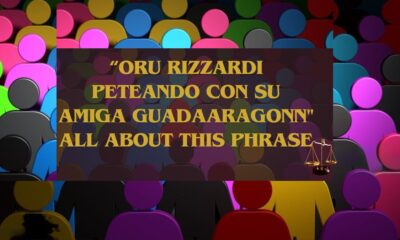Law
Seeking Compensation for Economic and Non-Economic Damages in Wrongful Death Cases

Wrongful Death: The death of a person is a profoundly sorrowful event, and when caused by another person’s carelessness or wrongdoings, the suffering can be significantly more difficult to endure.
In such situations, wrongful death claims made with a wrongful death claim lawyer can provide a pathway to justice and financial relief. Understanding the types of compensation available, both economic and non-economic, can help you navigate this complex process more effectively and working with a skilled wrongful death lawyer, you can navigate this challenging process with greater confidence and support.
So, let’s walk you through these concepts in a way that ensures you have the information needed to seek the compensation your family deserves.
Understanding Wrongful Death Claims
A wrongful death claim is made when someone passes away as a result of another person or entity’s legal negligence. These lawsuits may result from a variety of events, such as product defects, auto accidents, workplace mishaps, and medical negligence.
The goal of a wrongful death lawsuit is to make up for the losses the surviving family member of the dead has suffered financially.
Economic Damages: Tangible Losses
Economic or compensatory damages are intended to cover the financial losses resulting from the wrongful death. These damages are quantifiable and can include:
Medical Expenses
Any medical costs incurred as a result of the injury leading to death can be claimed. This includes hospital stays, surgeries, medications, and other treatment expenses.
Funeral and Burial Costs
The costs associated with the funeral and burial of the deceased can be significant. To ease the family’s financial burden, these expenses can be included in the claim.
Lost Income and Benefits
One of the most substantial components of economic damages is the loss of income that the deceased would have provided. This includes:
Future Earnings: The potential earnings the deceased would have made had they lived.
Loss of Benefits: This can include pension plans, health insurance, and other employment benefits that the family will no longer receive.
Loss of Inheritance
If the deceased was expected to leave behind an inheritance, the survivors might claim the value of that lost inheritance.
Household Services
It is also possible to seek compensation for the loss of domestic services rendered by the deceased, such as child care, cooking, and housekeeping.
Non-Economic Damages: Intangible Losses
Non-economic damages are more challenging to quantify as they pertain to the emotional and psychological impact of the loss. These damages, which acknowledge the significant psychological impact the death has on the survivors, consist of:
Pain and Suffering
Compensation for the emotional distress and mental anguish suffered by the deceased’s loved ones. This acknowledges the deep sorrow, grief, and trauma experienced.
Loss of Companionship and Consortium
This pertains to the loss of the deceased’s companionship, love, care, and guidance. For spouses, it also includes the loss of marital benefits and intimacy.
Loss of Parental Guidance
For children, the loss of a parent’s guidance, nurturing, and education can be compensated. This acknowledges the irreplaceable role a parent plays in a child’s life.
Emotional Distress
In some cases, compensation may be awarded for the severe emotional distress caused by witnessing the death or the suffering of the deceased prior to their passing.
How Compensation is Determined?
The amount and type of compensation awarded in a wrongful death case can vary greatly depending on several factors, including:
- The Circumstances of the Death: The specifics of how the death occurred and the degree of negligence or misconduct involved.
- The Relationship to the Deceased: Spouses, children, and parents typically have stronger claims for non-economic damages.
- Financial Dependency: The extent to which the survivors were financially dependent on the deceased.
- Jurisdiction: Laws regarding wrongful death claims can vary by state, affecting what types of damages can be claimed and the amount awarded.
Working with a Wrongful Death Lawyer
Handling a wrongful death lawsuit can be emotionally and cognitively demanding. Engaging the services of a knowledgeable wrongful death attorney can be very beneficial. They can:
- Evaluate Your Case: Assess the details of your situation to determine the strength of your claim and potential compensation.
- Gather Evidence: Collect the necessary documentation and evidence to support your claim.
- Negotiate with Insurers: Handle communications and negotiations with insurance companies to seek a fair settlement.
- Advocate for You in Legal Proceedings: If an equitable agreement is not achieved, they are prepared to advocate for you in legal settings, aiming to secure the compensation you are entitled to.
Conclusion
Seeking compensation for economic and non-economic damages in a wrongful death case is a crucial step toward achieving justice and financial stability after a devastating loss.
Remember, you are not alone. At every stage, legal experts are available to support you and make sure that the rights of your family are respected and the memory of your loved one is preserved.

-

 Entertainment7 months ago
Entertainment7 months ago欧乐影院: Elevating Your Streaming Experience
-

 Uncategorized7 months ago
Uncategorized7 months ago翻譯社 推薦 中翻韓
-

 Art11 months ago
Art11 months agoHunting SVG: A Digital Frontier in Design
-

 Entertainment2 months ago
Entertainment2 months agoOllyhibs: A TikTok Star’s Influence on the Sports Industry
-

 Art11 months ago
Art11 months agoFisher Price Breathing Hello Kitty: A Whimsical Companion for Kids
-

 Health & fitness10 months ago
Health & fitness10 months agoAlevemente: The Shocking Truth About it
-

 Technology10 months ago
Technology10 months agoAM2023x: Unlocking the Future
-

 Education10 months ago
Education10 months ago“Oru Rizzardi Peteando con Su Amiga Guadaaragonn” all about this phrase